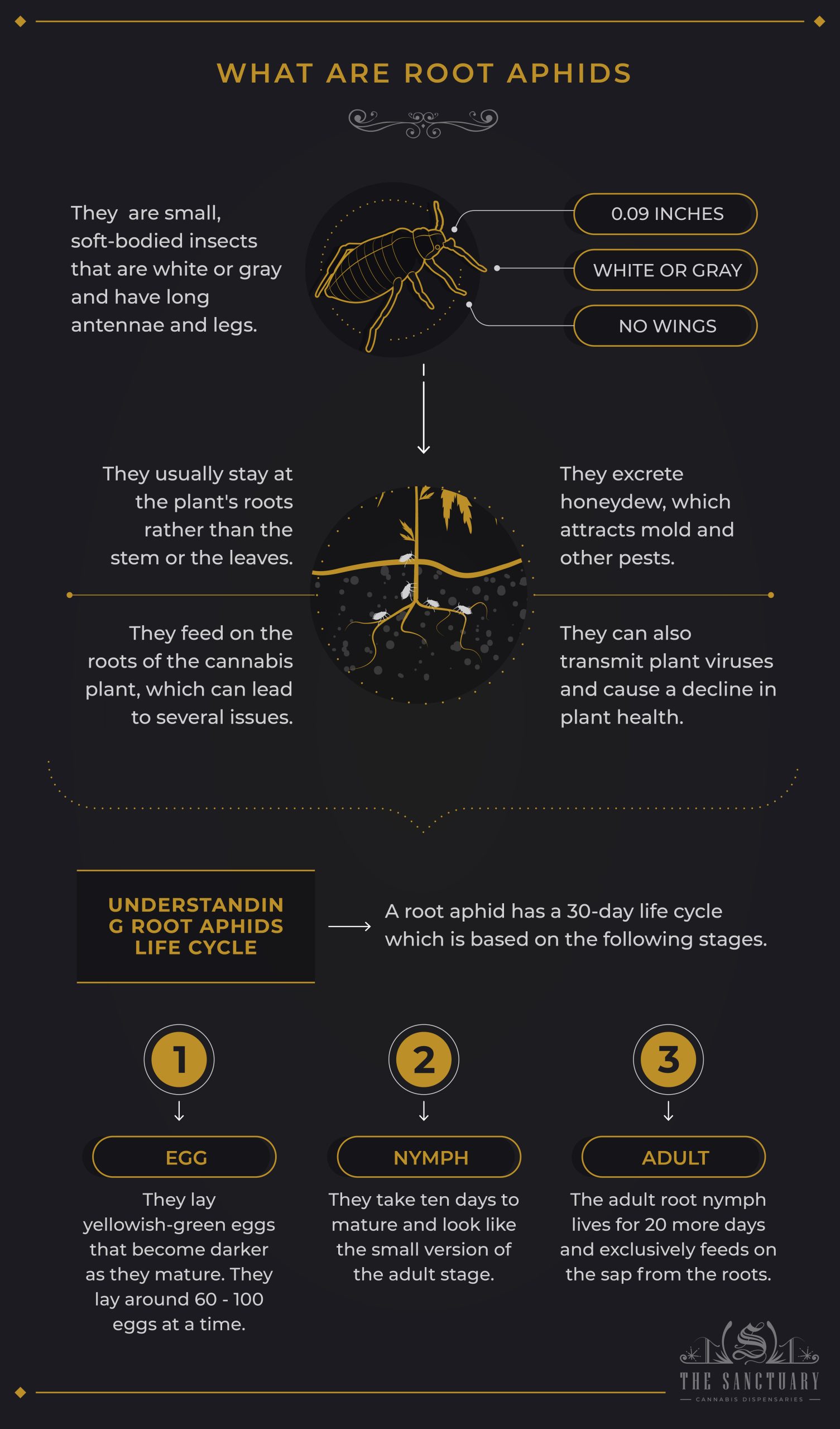Iftikhar Alam
Author
Reviewed by Cannabis Experts
Published on: April 24, 2023 | Updated on: September 11, 2024
Are your cannabis plants suddenly losing their health? The problem might be root aphids.
Root aphids are one of the most problematic pests in the cannabis cultivation industry. They feed on the plant’s roots, which can ultimately lead to a decline in plant health, stunted growth, and even death.
These tiny insects can be difficult to get rid of once they infest a grow room or pod. Therefore, it is important to know how to identify them and how to prevent and treat an infestation.
Here is how to know your cannabis plant is infested with root aphids and how to effectively get rid of these pests:
What are Root Aphids

Root aphids are small, soft-bodied insects that measure about 0.09 inches in length. They are white or gray and have long antennae and legs. Unlike other types of aphids, root aphids do not have wings.
They usually stay at the plant’s roots rather than the stem or the leaves. These pests extensively feed on the roots of the cannabis plant, which can lead to several issues.
As they feed, they excrete a sticky substance called honeydew, which can attract mold and other pests. Root aphids can also transmit plant viruses and cause a decline in plant health.
Understanding Root Aphids Life Cycle
A root aphid has a 30-day life cycle which is based on the following stages:
- Egg: Root aphids say tiny yellowish-green eggs that become darker as they mature. The adult female lays around 60 to hundred eggs at a time.
- Nymph: The root aphid nymphs take ten days to mature and look like the small version of the adult stage.
- Adult: The adult root nymph lives for 20 more days and exclusively feeds on the sap from the roots.
Do Root Aphids Grow on Cannabis Plants?
Root aphids can rapidly grow in the soil of cannabis plants, especially if grown indoors. They can also grow in hydroponic culture, making the plant vulnerable to damage in almost all conditions.
However, you can also find them in outdoor cultivation sites. Since big marijuana farms use high-grade pesticides and are under strict quality control, they deal with these infestations more effectively.
Preventing Root Aphids
The best way to deal with root aphids is to prevent them from infesting your grow room in the first place. Here are some tips for preventing the infestation:
Keep Your Grow Room Clean
A clean grow room or grow tent is less likely to attract pests like root aphids. Make sure to sweep up any debris or dead plant material, and disinfect your tools regularly.
Use Clean Soil
Root aphids can easily spread from plant to plant through soil. Use fresh, sterile soil that is free from pests and pathogens. It would help your other plants stay safe even if one plant got infected.
Monitor Your Plants Regularly
Keep an eye on your plants for signs of stress or pest infestation. Catching an infestation early can make it much easier to treat.
Avoid Overwatering the Roots
Root aphids thrive in wet conditions. Therefore it is important to avoid overwatering your plants. Allow the soil to dry out between waterings, or use a soil moisture sensor to know when to water.
Use Beneficial Insects
There are several beneficial insects that can help to prevent root aphids, including predatory mites and nematodes. These insects feed on root aphids. They do not disrupt plant growth and keep the root aphid population in check.
Treating Root Aphids Infestation
If you find yourself dealing with a root aphid infestation, there are a number of treatments that can help to get rid of them. Here are some of the most effective treatments for the elimination of such infestations:
Use Neem oil
Neem oil is a natural insecticide that can help kill root aphids. Mix 1 to 2 tablespoons of neem oil with one gallon of water and spray the solution onto the soil and the leaves of the cannabis plant. Make sure to thoroughly cover the infested area for the solution to work effectively.
Invest in Insecticidal Soap
Insecticidal soap is another natural insecticide that can be effective against root aphids. Mix one tablespoon of insecticidal soap with one gallon of water and spray the solution onto the cannabis plant. However, this solution will not be effective in eliminating the hard-shelled eggs of the aphids.
Introduce Beneficial Insects
As mentioned above, there are a number of beneficial insects that can help to control root aphids. Predatory mites and nematodes are particularly effective against root aphids. They not only prevent infestation but can also effectively eliminate the root aphid population.
Opt for Diatomaceous Earth
Diatomaceous earth is a natural substance made up of the fossilized remains of diatoms. It is abrasive to insects and can help kill root aphids. Sprinkle a thin layer of diatomaceous earth on the soil around the base of the plant to irritate and dehydrate aphids’ bodies.
Spray Hydrogen Peroxide
Hydrogen peroxide can kill root aphids and prevent mold and the growth of other pathogens. Mix one part hydrogen peroxide with four parts water and water the soil with the solution. Since aphid infestation can also promote black mold in the soil, hydrogen peroxide effectively inhibits fungal growth keeping your cannabis plant healthy.
Call Pest Control Service
If you cannot control the root aphid infestation with home remedies and over-the-counter pesticides, you must hire professional exterminators. These pest control experts have the tools and techniques to effectively eliminate root aphid infestation. They are also licensed to use the correct chemicals in the cannabis field.
Conclusion
Root aphids can be a major problem for cannabis growers, but there are many ways to prevent and treat an infestation. You can prevent root aphids by sanitizing grow pods, using clean soil, regular monitoring, avoiding overwatering, and using beneficial insects.
However, if an infestation occurs, natural treatments like neem oil, insecticidal soap, diatomaceous earth, and hydrogen peroxide can be effective in getting rid of these nasty pests. Remember, prevention is key when dealing with pests in your cannabis grow room. So, stay vigilant and act quickly if you notice signs of a problem.
With the right tools and knowledge, you can keep your plants healthy for the perfect cannabis harvest every season!
The content provided on this blog is for informational purposes only and does not constitute medical, legal, or professional advice. Cannabis use is subject to local laws and regulations, which vary widely by jurisdiction. Always consult with a healthcare professional before starting any new treatment or altering an existing treatment regimen. The authors and publishers of this blog are not responsible for any actions taken based on the information provided herein. Use cannabis responsibly and in accordance with applicable laws. This blog is intended for adults aged 21 and over. The Sanctuary Dispensaries D186, D187.








